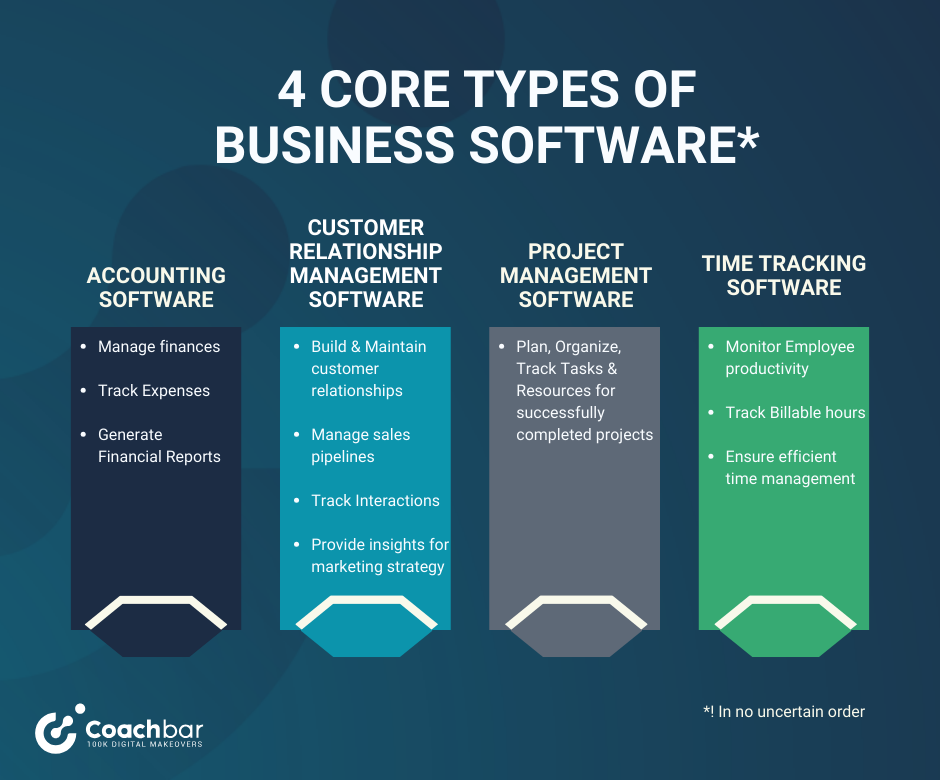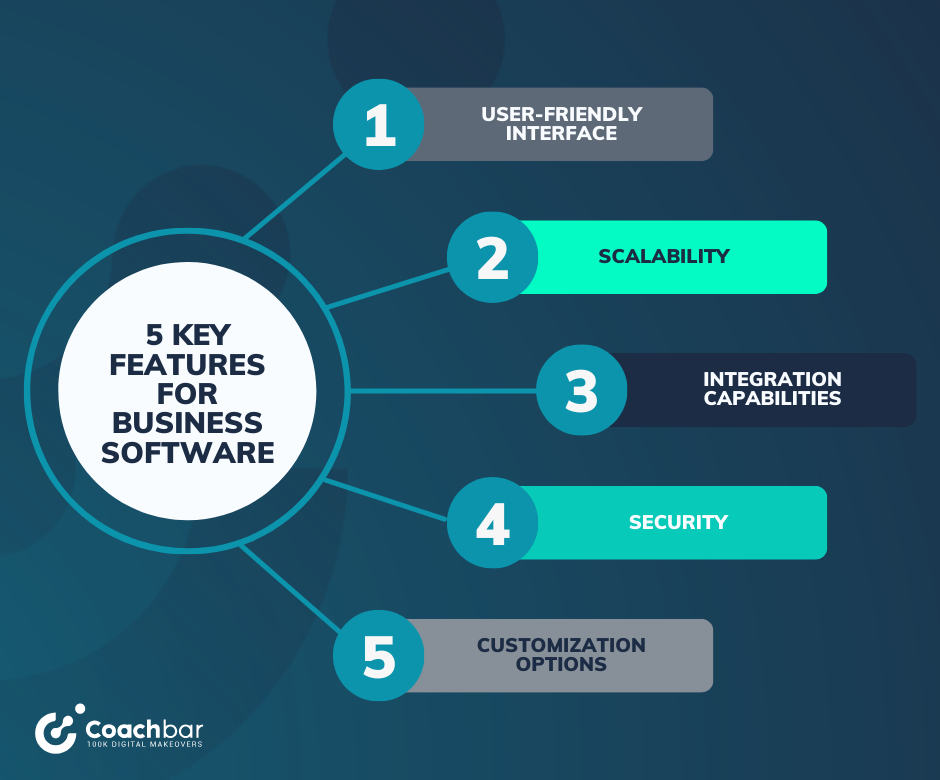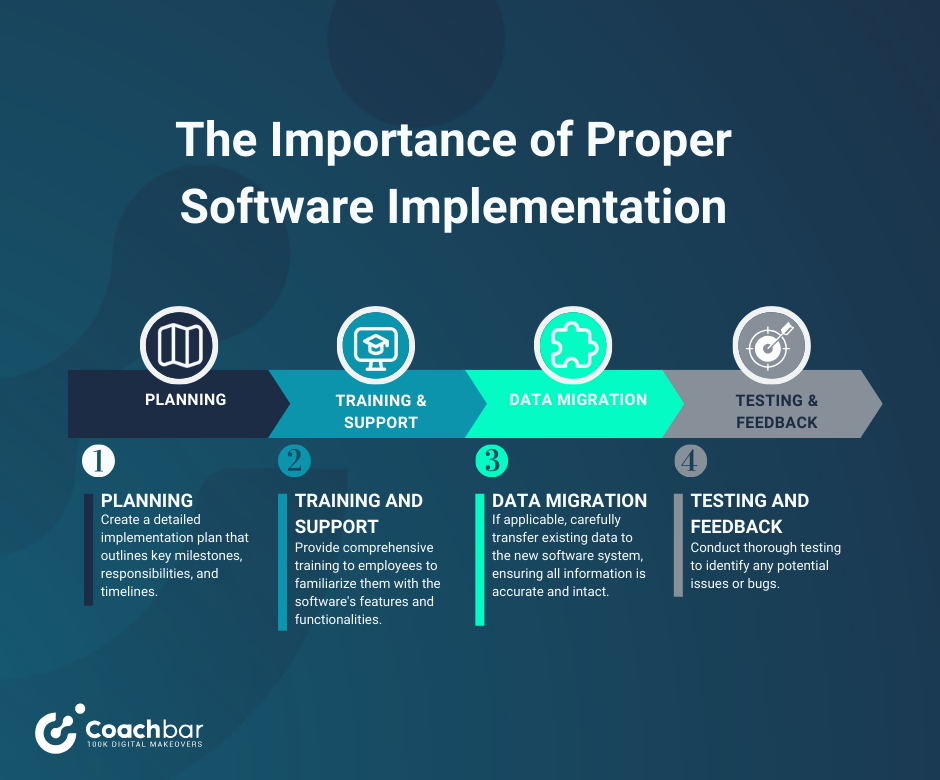Did you know that about 50% of all business processes can be automated using business software, yet only 4% of businesses have achieved a fully digitalized, automated workspace.
Running a successful business relies on business software. But with countless options available on the market, it can be overwhelming to determine which software is the right fit for your specific needs.
In this article, we will explore what business software is, the various types available, key features to consider, and how to make the final decision that will take your business to new heights.
Table of Contents
ToggleWhat is business software?
Business software is a collection of applications and programs designed to help you achieve your business goals and streamline your operations. Whether you're a small startup or a well-established corporation, the right software can help you manage finances, track inventory, communicate with customers, and automate tasks, just to name a few possibilities.
The core purpose of business software is automation. By automating repetitive tasks, your business can save time and reduce human error. The right software can automate invoice generation and payment reminders, eliminate the need for manual data entry, and significantly reducing the risk of errors. Around 34% of SMBs report less human error after adopting workflow automation. Automation also frees up employees to focus on more strategic and value-added activities, leading to increased productivity and innovation within the organization.
Business software also provides valuable insights through data analytics. By collecting and analyzing data from various sources, businesses can gain a deeper understanding of their operations, customer behavior, and market trends. This data-driven approach allows businesses to make data-backed decisions, identify areas for improvement, and seize new opportunities. It’s no wonder that 75% of businesses say that using automation software gives them a competitive advantage.
The 4 core types of business software
When it comes to choosing the right software for your business, it's important to first understand the different types that are available. There are dozens of software options, but they tend to fall into four core categories:
- Accounting software: Essential for managing finances, tracking expenses, and generating financial reports.
- Customer Relationship Management (CRM) software: Helps you build and maintain relationships with your customers by managing sales pipelines, tracking interactions, and providing insights for effective marketing strategies.
- Project management software: Ideal for planning, organizing, and tracking tasks and resources to ensure projects are completed successfully and on time.
- Time tracking software: Enables you to monitor employee productivity, track billable hours, and ensure efficient time management.

Accounting software is a crucial tool for businesses of all sizes. Whether you're a small startup or a multinational corporation, keeping track of your finances is essential for success.
With accounting software, you can easily manage your income and expenses, generate financial reports, and ensure compliance with tax regulations. This software allows you to streamline your financial processes, saving you time and reducing the risk of costly errors.
Customer Relationship Management (CRM) software is another essential tool for businesses that want to build strong relationships with their customers. It allows you to centralize customer data, track interactions, and manage sales pipelines.
With CRM software, you can easily access customer information, track their preferences and purchase history, and provide personalized experiences. This software also provides valuable insights for effective marketing strategies, helping you target the right audience and boost customer retention.
If you regularly have complex projects in your business, project management software is a must. It allows you to plan, organize, and track tasks and resources, ensuring that projects are completed successfully and on time.
You can create project timelines, assign tasks to team members, track progress, and collaborate effectively. This software also helps you manage resources efficiently, ensuring that you have the right people and materials for each project.
This software isn’t just about staying productive, it allows you to track the time spent on different tasks, monitor billable hours, and identify areas where time is being wasted. You’ll also get valuable insights into how your team is utilizing their time, allowing you to identify bottlenecks and make necessary adjustments.
One of the best features of this type of business software is the ability to accurately bill clients for the time spent on their projects, ensuring fair and transparent invoicing.
While the above examples cover some of the most common types of business software, it's important to note that the options are vast and varied. Depending on your industry and specific business needs, there may be specialized software available to address your unique requirements.
If you're in the healthcare industry, there are business software solutions specifically designed for medical billing and patient management. Similarly, if you're in the retail sector, there are software options tailored for inventory management and point-of-sale operations.
Investing in the right software can significantly improve your business operations, increase productivity, and drive growth. Take the time to research and evaluate different options, and consider consulting with experts if you’re struggling to choose the right tools.
Our team of software coaches at CoachBar are here to help make the process of software implementation a breeze. They’ll show you which software options are best for your business and take you through the entire implementation process so you get the most out of your new business tools.
5 key features to look for in business software
If you’re in the process of comparing different business software options, there are five important features to look for.
User-friendly interface
One of the most important features to look for in business software is a user-friendly interface. Your employees should be able to easily navigate and learn the software without extensive training. A well-designed interface can save time and increase productivity, allowing your team to focus on more important tasks. The harder the software is to learn, the longer it will take to implement.

Scalability
As your business grows and evolves, your software should be able to adapt to changing needs. Investing in scalable software ensures that you won't outgrow your system quickly and helps you avoid the hassle of migrating to a new solution in the future.
Integration capabilities
Your business probably already relies on various systems and tools to operate efficiently. So it's important to choose software that can seamlessly integrate with your existing infrastructure. This integration allows for a smooth flow of data and eliminates the need for manual data entry, saving time and reducing errors.
Security
Security should be a top priority when selecting business software. Protecting sensitive business data is crucial in today's digital landscape. Look for software that offers robust security measures such as encryption, user authentication, and regular data backups. By choosing secure software, you can minimize the risk of data breaches and ensure the confidentiality of your company's information.
Customization options
Customization options are also worth considering. Every business has unique processes and workflows, so your software should be tailored to your specific needs.
By carefully evaluating these key features, you can narrow down your options and find the software that best aligns with your business goals and requirements. Remember, investing time in researching and selecting the right software now can save you significant time, money, and headaches in the future.
How to select the right software for your business
When it comes to finding the right software for your business, there’s an easy step-by-step process to follow:
- Assess your needs: Consider your business objectives, pain points, and areas that require improvement. This will help you identify software features that are crucial for your operations.
- Research and compare: Take the time to research different software options and compare their features, pricing, customer reviews, and support services. This will give you a well-rounded perspective before making a decision.
- Consult with stakeholders: Gather input from relevant stakeholders within your business, such as department heads or IT professionals. Their perspectives can provide valuable insights and help you make an informed decision.
- Take advantage of free trials and demos: Before committing to a software provider, take advantage of free trials and demos to test the software's capabilities and user-friendliness.
By following these steps, you can make a more confident decision and choose software that will positively impact your business.
The importance of proper software implementation
Without proper software implementation, about 78% of businesses give up on the software and revert back to their old processes. That’s a lot of time and money wasted!. Here are a few essential steps to ensure successful software implementation:

- Planning: Create a detailed implementation plan that outlines key milestones, responsibilities, and timelines. Engage relevant departments and team members to ensure everyone is on board.
- Training and support: Provide comprehensive training to employees to familiarize them with the software's features and functionalities. Offer ongoing support to address any questions or issues that arise.
- Data migration: If applicable, carefully transfer existing data to the new software system, ensuring all information is accurate and intact.
- Testing and feedback: Conduct thorough testing to identify any potential issues or bugs. Encourage employees to provide feedback and make necessary adjustments before full deployment.
Making the final software decision
Choosing the right software for your business is an important decision for any business owner, and one that needs careful thought. It's essential to evaluate the various options available, consider your business needs, and involve key stakeholders in the decision-making process.
By following these steps and conducting thorough research, you can confidently select software that will enhance your operations and drive long-term success.
At Coachbar, we help ensure business choose the best software for their needs.
Implement your next software transition successfully by contacting a Coachbar business analyst today.

